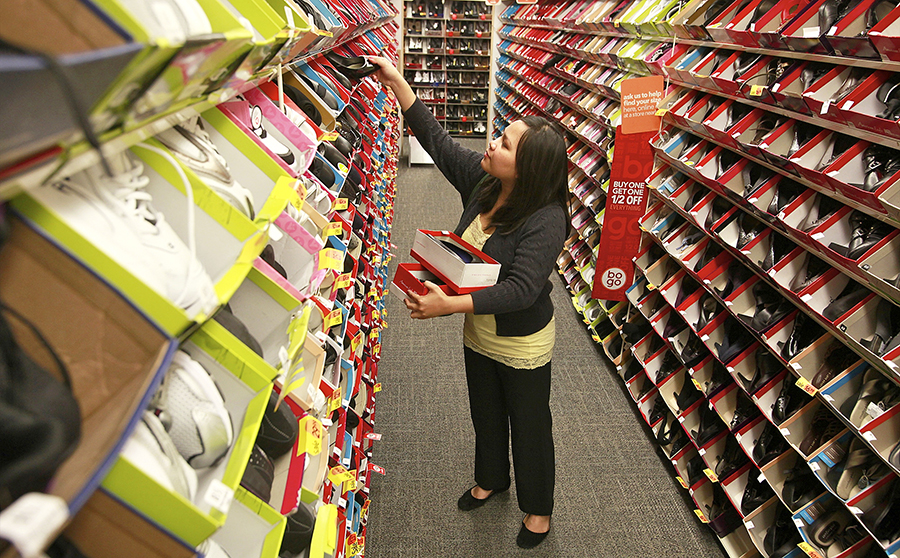<span style="color: #999999;">Payless ShoeSource, Shopko, Barneys, and Fred’s led with a number of companies that landed in bankruptcy court in 2019. Other filings included Skins, Campus Den, Loot Crate, and Mad Dogg Athletics.
The bankruptcy caseload was lighter than 2018, when the filers included Performance Bicycle, Sears, Rockport, Bon-Ton, Walking Company, and Remington. It was also considerably calmer than prior years when a number of retailers in the active lifestyle space liquidated. Those included Sports Authority, MC Sports, Golfsmith, City Sports, Gander Mountain, and Toys “R” Us. Inventory flooded the market from many of those exits presenting challenges to selling merchandise anywhere near full-price.
While the bankruptcies lessened in 2019, a record number of store closings are estimated this year in the U.S. as the overall industry continues to feel the competition from online selling. According to Coresight, retailers in the U.S. announced plans to shutter more than 9,300 locations, well above 2018’s closure tally of 5,844. The previous record was 8,069 store closures announced in 2017. Beyond Payless and Shopko, chains closing a significant number of stores, or exiting the marketplace, included Dressbarn, Charming Charlie, GNC, Charlotte Russe, Gymboree, A Pea in the Pod, and Motherhood Maternity.
The following summarizes 2019’s major bankruptcy cases:
- Ascent Outdoors and Ascent Cycles shuttered three of its Seattle stores unexpectedly in April, with owner Solon Scott reportedly filing for bankruptcy. In late June, news arrived that Sandeep Nain, the founder of retail and mountain climbing group Miyar Adventures, acquired the business and one store in Ballard, a neighborhood in northwestern Seattle, has re-opened.
- Barneys New York, which is credited with helping launch the careers of many designers, filed for bankruptcy protection on August 6 with plans to close 15 of its 22 stores and seek a buyer. On November 1, Authentic Brands Group officially became the owner of Barneys in a $271 million deal that is expected to result in the closure of most, if not all, stores. Only Barneys Madison Avenue flagship in Manhattan will stay open for a little longer, in a slimmed-down form, as Barneys’ new owner negotiates with the landlord. ABG is expected to continue to license the brand in some fashion. A controversial scheme includes placing Barneys pop-ups in 40 Saks Fifth Avenue stores, including a 5,000-square-foot version in Saks’ New York City flagship.
- Campus Den, a retailer specializing in fan gear of Michigan universities with 16 locations, filed for bankruptcy protection in May after closing 11 unprofitable stores over the prior year. The retailer blamed its struggles in part to a steep decline in Michigan State University merchandise after sexual-abuse allegations and charges surfaced against Larry Nassar, MSU’s former athletic trainer who had been the USA Gymnastics (USAG) national team doctor. Weak mall traffic was another factor in Campus Den’s slowdown in sales that began in 2017. In a disclosure statement supporting its reorganization plan, Campus Den noted that results had improved in recent months and it had also re-secured shipments from the majority of its vendors. One holdout had been Nike, which accounted for about 23 percent of its revenues in its last fiscal year. Campus Den believes that access to high-quality brands, including Champion, Columbia, Top Of The World, Colosseum, Genuine, New Era, Wes And Willy, and 47 Brand, will offset the loss of Nike. Success has also been found with the Great State program in which the company designs its own proprietary apparel with flag patterns, variations on the state map and outdoor scenes honoring the state of Michigan. The reorganization plan calls for Campus Den to continue to be led by John Damoth, John Dragomer and Tom Taylor and is seeking court approval.
- Denali, an outdoor and athletic chain based in Guilford, CT, announced in July that it would close. The company began in the early 1990s as Trailblazer in New Haven and had reached seven locations. Five of its remaining locations closed this year.
- Fred’s, the general merchandiser and pharmacy chain based in Memphis, TN, filed for bankruptcy on September 9 and closed its remaining approximately 80 stores. Fred’s had 568 stores in 15 states in the southeastern U.S. as of February 2, including 169 with full-service pharmacies, but underwent multiple rounds of store closures prior to the bankruptcy filing. Founded in 1947, Fred’s targeted “value-oriented and budget-conscious” consumers, mostly in towns with populations of 15,000 or less. Stores averaged about 15,000 square feet and carried a wide variety of merchandise, including brand-name and off-brand goods.
- Herb Philipson, the sporting goods chain in Central New York, initially filed for Chapter 11 bankruptcy reorganization in October 2018 and moved to liquidate its remaining three stores after failing to find a buyer at a July 2019 auction. Founded in Rome, NY, in 1951, a longtime Herb Philipson’s employee, Guy Viti, purchased the company from the Philipson family in March 2018. At the time of the sale, Herb Philipson had 10 stores.
- Loot Crate, the provider of fan subscription boxes backed by actor Robert Downey Jr.’s venture-capital firm, filed for bankruptcy on August 12 to facilitate a sale. A Delaware bankruptcy judge approved the sale for $30 million on September 26 to Loot Crate’s lender, an affiliate of Money Chest, and the business soon merged with collectible manufacturing company NECA Inc., which produces X-Men, Star Trek, Batman, and other pop culture figures. Joel Weinshanker, the majority owner of Money Chest, also owns NECA. Founded in 2012, and one of the early subscription boxes, Loot Crate shipped to more than 250,000 subscribers and sent out around 32 million parcels filled with fan memorabilia for gamers, pop culture enthusiasts and sports geeks.
- Mad Dogg Athletics, one of the pioneers of indoor cycling, filed a Chapter 11 petition in August to restructure its operations and debt. The filing came after three years of steady revenue declines that culminated in a loss in 2018. The biggest factor in the bankruptcy was a dispute over the termination of its Bodyblade license and distribution agreement in 2016 that led to a massive judgment against Mad Dogg and the company to fall out of compliance with its bank loan. Secondary factors included a failed attempt to build a platform to compete with Peleton, a botched website upgrade, production delays faced by its Peak Pilates business, and a challenging transition of the commercial licensee for Spinning to Precor. In an affidavit filed in bankruptcy court in Los Angeles, John Baudhuin, founder and CEO, wrote that the company’s core business remains viable absent the extraordinary issues faced over the last few years to reorganize successfully. The sale of the business is not contemplated.
- Payless ShoeSource filed for Chapter 11 bankruptcy protection for the second time on February 16 and closed all its roughly 2,500 stores in North America by May 2019. Payless locations are in about three dozen other countries, including 420 company-owned stores and 370 international franchised stores, which remained open. Payless blamed the filing on major disruptions in the company’s supply chain that hurt its 2017 holiday shopping season and a computer system breakdown in summer 2018 that impacted back-to-school sales. Both situations led to an over-supply of inventory and the need for drastic markdowns in the back-half of 2018. The company was also encumbered by excessive debt following its 2012 spinoff to private equity firms Blum and Golden Gate. At the time of the bankruptcy filing, Payless’ chief restructuring officer, Stephen Marotta, said in a statement, “The prior proceedings left the company with too much remaining debt, too large a store footprint, and yet-to-be-realized systems and corporate overhead structure consolidation.”
- Shopko, the operator of general merchandise stores based in Green Bay, WI, on January 17 filed for Chapter 11 in the District of Nebraska. The company blamed “excess debt and ongoing competitive pressures.” After closing three dozen stores in December, Shopko said it would close more than 100 when it formally filed for bankruptcy. In February, it expanded its closure list again to more than 250 of its 363 stores. By March, Shopko announced plans to close its remaining 120 stores by mid-June after failing to find a buyer. The company was founded in Chicago in 1961 and opened its first location in Green Bay in 1962.
- Skins, the Australian apparel manufacturer known for its compression products, filed for bankruptcy in a Swiss Court. The company blamed the global financial crisis that eventually led to the company taking on too much debt to buy out private-equity investors. In mid-December, Hong Kong-based Symphony Holdings Limited, which owns the Pony sneaker brand, announced that it had completed the acquisition of the global trademarks and patents of Skins. Symphony Holdings plans to expand the brand across Asia while forming a joint venture company with an international conglomerate to jointly-operate the Skins brand and reach additional global markets.
Photo courtesy Payless
















